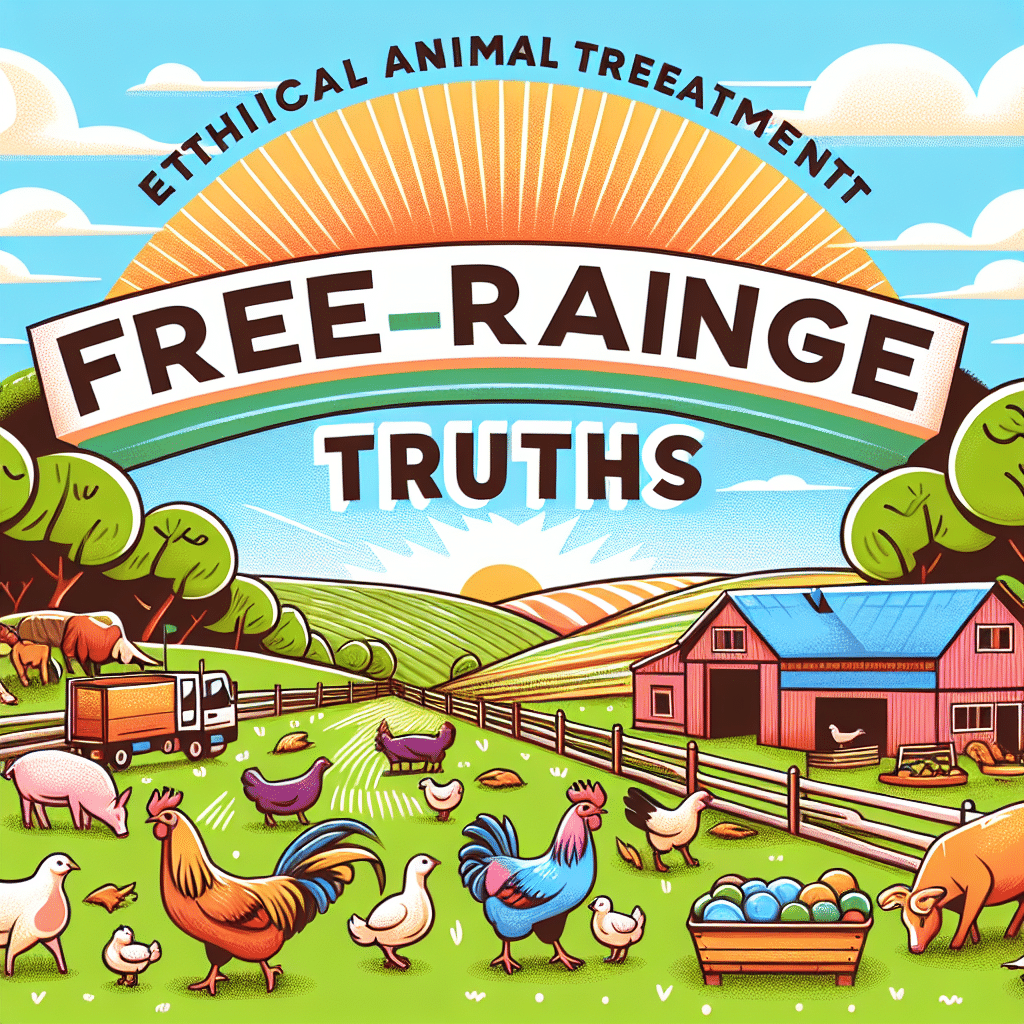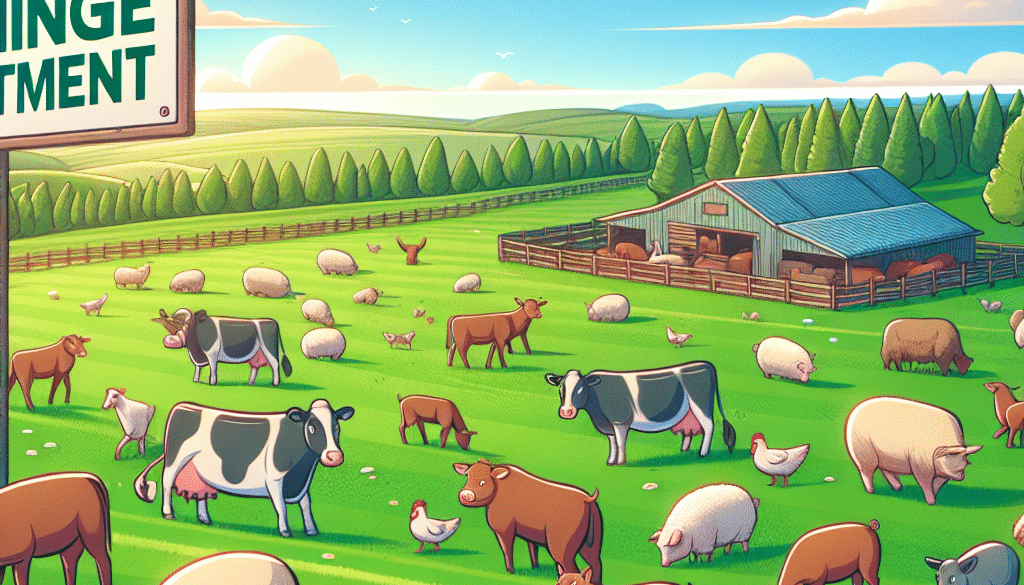Ethical Animal Treatment: Free-Range Truths
-
Table of Contents
- Free-Range Truths: Unveiling Ethical Animal Treatment
- Understanding Free-Range Farming
- The Ethical Dimension of Free-Range Farming
- Debunking Free-Range Myths
- Case Studies and Statistics
- How to Ensure You’re Buying Ethically
- Conclusion: The Path to Ethical Consumption
- Discover ETprotein’s Ethical Protein Products
Free-Range Truths: Unveiling Ethical Animal Treatment

When it comes to the food we eat, the ethical treatment of animals is a growing concern for consumers worldwide. The term “free-range” often conjures images of happy animals roaming in open pastures, living lives that are as natural as possible. But what does free-range really mean, and does it ensure ethical treatment? This article delves into the truths behind free-range farming, exploring the ethical implications and providing insights into how consumers can make informed choices.
Understanding Free-Range Farming
Free-range farming is a method of animal husbandry where animals, instead of being confined in enclosures, are allowed to roam freely for at least part of the day. However, the specifics can vary greatly depending on the country, the type of animal, and the certification standards in place.
- Free-range poultry must have access to the outdoors, but the amount of time and space available can differ.
- Free-range cattle and pigs should have access to pasture, but again, the standards for what constitutes adequate space and time outdoors are not universally defined.
While free-range farming is a step towards more ethical treatment of animals, it is not without its challenges and controversies.
The Ethical Dimension of Free-Range Farming
At its core, free-range farming aims to address the ethical concerns associated with intensive animal farming practices. These concerns include:
- Animal welfare: Free-range systems are designed to provide a better quality of life for animals, allowing them to exhibit natural behaviors.
- Environmental impact: Free-range farming can potentially lead to less environmental degradation compared to conventional intensive farming systems.
- Health benefits: Some studies suggest that free-range animal products may be healthier, containing higher levels of certain beneficial nutrients.
However, the reality of free-range farming can sometimes fall short of these ethical goals.
Debunking Free-Range Myths
While free-range farming has its advantages, there are several misconceptions that consumers should be aware of:
- Space Standards: The term “free-range” does not always guarantee ample space for each animal. Regulations vary, and in some cases, the outdoor space provided is minimal.
- Outdoor Access: Access to the outdoors does not always mean that animals actually spend significant time outside. Weather conditions, herd dynamics, and the design of the facilities can limit outdoor access.
- Animal Health: Free-range animals can be more susceptible to diseases and predation, which can lead to ethical dilemmas regarding their treatment and protection.
Understanding these nuances is crucial for consumers who are concerned about animal welfare and ethical consumption.
Case Studies and Statistics
Several case studies highlight the complexities of free-range farming. For instance, a study on free-range egg production in Europe found that while hens had more freedom, they also faced higher risks of parasitic infections. Another case study involving free-range pork production in Australia revealed that while the pigs had better muscle development due to increased movement, they also required more careful management to prevent sunburn and heat stress.
Statistics show that the demand for free-range products is on the rise. According to the Organic Trade Association, sales of organic meat, poultry, and fish, which often adhere to free-range standards, increased by 11% in 2020. This trend indicates a growing consumer interest in ethically produced animal products.
How to Ensure You’re Buying Ethically
To make truly ethical choices, consumers need to look beyond the free-range label:
- Research certification standards: Understand the specific requirements of free-range certifications in your region.
- Know the source: Whenever possible, buy from local farmers who you can trust to uphold high animal welfare standards.
- Look for additional certifications: Labels such as “organic” or “humane” can provide further assurance of ethical treatment.
By taking these steps, consumers can support farming practices that are more aligned with their ethical values.
Conclusion: The Path to Ethical Consumption
The truth about free-range farming is that it represents a spectrum of practices, some of which are more ethical than others. While the concept is rooted in improving animal welfare and reducing environmental impact, the implementation can vary widely. Consumers who are concerned about animal treatment must look beyond the label, educating themselves about the standards and practices behind it. By doing so, they can make choices that support the welfare of animals and the health of the planet.
Discover ETprotein’s Ethical Protein Products
For those committed to ethical consumption, incorporating plant-based proteins into their diet is a powerful step. ETprotein offers a range of high-quality vegan protein products that align with ethical and environmental values. Their organic bulk vegan protein and plant proteins are non-GMO, allergen-free, and sourced with sustainability in mind. Whether you’re involved in the food and beverage industry or seeking personal health and wellness products, ETprotein’s offerings provide a responsible choice for meeting your protein needs.
About ETprotein:
ETprotein, a reputable plant protein vegan protein Chinese factory manufacturer and supplier, is renowned for producing, stocking, exporting, and delivering the highest quality organic bulk vegan protein and plant proteins. They include Organic rice protein, clear rice protein, pea protein, clear pea protein, watermelon seed protein, pumpkin seed protein, sunflower seed protein, mung bean protein, peanut protein etc. Their offerings, characterized by a neutral taste, non-GMO, allergen-free attributes, cater to a diverse range of industries. They serve nutraceutical, pharmaceutical, cosmeceutical, veterinary, as well as food and beverage finished product distributors, traders, and manufacturers across Europe, USA, Canada, Australia, Thailand, Japan, Korea, Brazil, and Chile, among others.
ETprotein specialization includes exporting and delivering tailor-made protein powder and finished nutritional supplements. Their extensive product range covers sectors like Food and Beverage, Sports Nutrition, Weight Management, Dietary Supplements, Health and Wellness Products, and Infant Formula, ensuring comprehensive solutions to meet all your protein needs.
As a trusted company by leading global food and beverage brands and Fortune 500 companies, ETprotein reinforces China’s reputation in the global arena. For more information or to sample their products, please contact them and email sales(at)ETprotein.com today.












